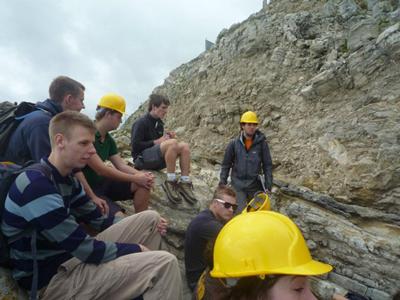New £8 Million Training Centre for the Oil and Gas Researchers of Tomorrow

Postgraduate training in geological and environmental research into oil and gas activities has received £8 million funding for a new country wide training centre.
The new Centre for Doctoral Training (CDT), funded by the Natural Environment Research Council (NERC), led by Heriot-Watt University, and involving 19 UK institutes, will focus on creating a highly skilled workforce with expertise that can be used across the wider energy and environmental sectors, as well as filling skills gaps in the oil and gas sector. This workforce of the future will help equip the industry with the skills needed to reduce the environmental impact of oil and gas exploration and extraction.
As well as a £2.8 million investment by NERC, the consortium has already committed to invest a further £5.2 million. NERC is also expecting to leverage up to four times its investment from overseas universities and institutions, and business.
The CDT will support a minimum of 90 postgraduate students over the next 6 years, 30 of whom will be funded by NERC, all of whom will benefit from being embedded alongside world-class researchers and industry partners in the form of placements, mentoring, facilities and equipment. Crucial to the success of this endeavour will be a 20-week high-quality training package for the PhD students, with each student benefiting from a rich cross-consortium teaching experience, conferences and fieldtrips for the entire CDT cohort and industry placements.
The Graduate School of the National Oceanography Centre Southampton (GSNOCS),
a joint venture between the University of Southampton and the National Oceanography Centre, is a member of this consortium that also includes: seven core partners (Heriot-Watt, Imperial College, Aberdeen, Oxford, Durham and Manchester Universities and the British Geological Survey) and a further 10 associate partners (Birmingham, Camborne, Cardiff, Dundee, Glasgow, Keele, Newcastle, Nottingham, Royal Holloway and Strathclyde).
Dr Justin Dix
, Head of Geology and Geophysics at the University of Southampton, said: “Being able to bring together academic expertise from both the University of Southampton and NOC, in addition to the exceptional training opportunities provided by the wider consortium, will make for an outstanding opportunity for any young researcher wishing to go into this important field.”
GSNOCS will be offering nine fully funded 4-year PhD’s as part of the CDT, three per year for the next three years. Each PhD will come with appropriate research funds and/or data and, in many cases, additional support from industry sponsors. The deadline for applications for the first round (entry October 2014) of these positions is the 20th February 2014, with the details of the
GSNOCS projects eligible for CDT awards
.
Projects from other consortium partners can be found here.
Dr Angus Best,
Associate Head of Marine Geoscience at the National Oceanography Centre, said: “NOC is extremely pleased to be part of this exciting new postgraduate training consortium through the Graduate School, a good example of how NOC is engaging with the oil and gas sector to address UK future energy needs.”
Professor Duncan Wingham, chief executive of NERC, said: “Looking across the sectors that provide growth in the UK’s economy, and where a strong understanding of the environment is absolutely essential, it is hard to think of one where the need is higher than in oil and gas. It’s vital that NERC contributes to ensuring growth with responsible environmental management for the industry.”
Universities and Science Minister David Willetts said: “Working alongside leading businesses in the oil and gas sector to improve our skills base is vital to the success of the government’s industrial strategy. NERC’s plans to develop a centre for doctoral training will support the growth of the UK’s offshore oil and gas resources and attract further overseas investment, keeping the UK ahead in the global race.”
Notes for editors
- The Graduate School of the National Oceanography Centre, Southampton (GSNOCS) is a partnership between the University of Southampton and the National Oceanography Centre. As a centre of excellence for Ocean and Earth science, NOCS is comprehensively equipped with world-class laboratories and state of the art experimental equipment and is a word-leader for research and teaching. Through its unique waterfront position, facilities and strength of expertise the centre has attracted prominent research scientists and educators from across the world. The goal is to provide the best possible education ensuring that PhD students have the skills to operate at the very cutting edge of research.
- Image - Southampton students on an AAPG Fieldtrip to the Wessex Basin
For more information contact Glenn Harris (UoS) or Kim Marshall-Brown (NOC):
Glenn Harris, Media Relations, University of Southampton: Tel +44 (0)23 8059 3212, email G.Harris@soton.ac.uk
Kim Marshall-Brown, Media and Communications Officer, National Oceanography Centre, Tel: +44 (0)23 8059 6170, email: kxm@noc.ac.uk